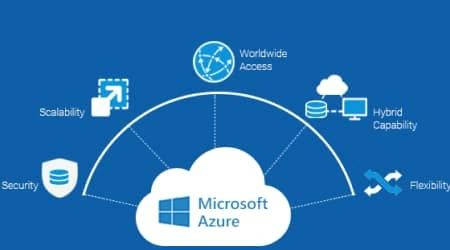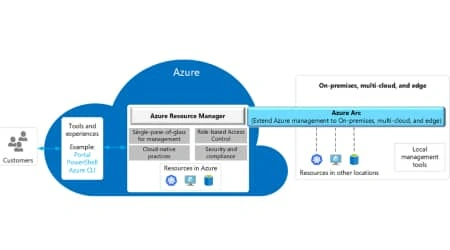

In recent years, cloud computing has become a popular technology trend for businesses of all sizes. Cloud computing provides organizations with the ability to access data and applications from anywhere with an internet connection. With a range of cloud computing providers available, one of the most popular choices for businesses is Azure.
Microsoft Azure is a cloud computing platform that provides a wide range of services to help organizations manage their data and applications in the cloud. In this blog, we will discuss the top features and benefits of using Microsoft Azure for your business.
The Most Important Features of Microsoft Azure
Data Storage and Management
Microsoft Azure offers a comprehensive range of data storage and management services. With Azure Blob Storage, businesses can securely store and retrieve vast quantities of unstructured data, including images, videos, and documents. Azure SQL Database provides a fully managed, scalable, and dependable relational database service, while Azure Cosmos DB offers globally distributed capabilities for handling diverse data types.
These services allow businesses to efficiently manage their data, ensuring data integrity, and leverage advanced analytics and insights. The key features of Microsoft Azure include secure storage, scalability, reliability, diverse data handling, and advanced analytics capabilities.

AI and Machine Learning
Azure’s integration with artificial intelligence (AI) and machine learning (ML) services empowers businesses to leverage advanced analytics and automation capabilities. Azure Machine Learning enables businesses to build, train, and deploy ML models, allowing them to gain valuable insights from their data. Azure Cognitive Services offers pre-built AI models for various tasks, such as speech recognition, language understanding, and computer vision. These AI-powered services can enhance customer experiences, automate processes, and drive innovation.

Single-Pane Operations
Microsoft Azure offers a powerful feature called single-pane operations, providing a unified view of hybrid environments through the Operation Management Suite (OMS). OMS, a Management-as-a-Service (MaaS), allows seamless monitoring and management of diverse data sources, including virtual machines, storage, network services, logs, and insights. With OMS, security is prioritized as it offers comprehensive solutions to address security challenges in hybrid infrastructures.
These solutions include threat intelligence, patch level monitoring, and malware detection, offering valuable insights into the interconnectedness of resources within your network infrastructure. Experience streamlined operations and heightened security with Microsoft Azure’s single-pane operations and OMS.

Hybrid Capabilities
Azure seamlessly integrates with on-premises infrastructure, allowing businesses to adopt a hybrid cloud approach. Azure Stack enables organizations to run Azure services on their own hardware, while Azure Arc extends Azure management and services to any infrastructure, including other cloud providers. This hybrid capability offers businesses greater flexibility and control over their IT environment, enabling them to leverage the benefits of both on-premises and cloud solutions.
Computational Services
Microsoft Azure provides a range of computational services, including IaaS and PaaS features. Developers can leverage PaaS features to publish and manage website aspects effectively. With staging environments, applications can be partially deployed and tested for bugs or issues before going live, ensuring a smooth user experience and seamless functionality without compromising the site’s performance.
Benefits of Microsoft Azure
Scalability and Flexibility
One of the key benefits of Microsoft Azure is its unmatched scalability and flexibility. Whether your business is experiencing rapid growth or needs to accommodate seasonal fluctuations, Azure allows you to effortlessly scale your infrastructure up or down as per your requirements.
In addition, Azure provides a wide range of services, including virtual machines, storage, and networking, allowing businesses to build custom solutions that meet their specific needs. This flexibility allows organizations to create and deploy applications quickly and easily, improving time to market and providing a competitive advantage.
Security and Compliance
Data security and compliance are top priorities for any business, and Microsoft Azure provides a range of features and services to help organizations protect their data in the cloud. Azure’s security and compliance features include built-in threat intelligence, compliance certifications, and advanced threat protection.
Azure also provides role-based access control, allowing organizations to control who has access to their data and applications. Additionally, it provides encryption at rest and in transit, ensuring that data is protected throughout the entire lifecycle.
Cost Savings
One of the biggest benefits of Azure is its cost savings. Migrating to Microsoft Azure can lead to significant cost savings for businesses. With Azure, there are no upfront costs for hardware or infrastructure, and organizations only pay for the services they use. This means that businesses can reduce their capital expenditures and operational expenses, while still having access to the latest technology and features.
In addition, Azure provides a range of tools and services to help businesses optimize their cloud spend, including cost management and resource optimization tools. These tools allow organizations to monitor and control their Azure costs, ensuring that they are only paying for what they need.
Disaster Recovery and Business Continuity
Disaster recovery and business continuity are critical for businesses of all sizes. Microsoft Azure provides a range of services to help organizations protect their data and applications in the event of a disaster.
Azure Site Recovery allows businesses to replicate their applications and data to a secondary location, ensuring that they can quickly recover in the event of an outage or disaster. Azure Backup provides automated backups for virtual machines and applications, ensuring that critical data is always protected.
Improved Collaboration and Productivity
Microsoft Azure provides a range of tools and services to improve collaboration and productivity for businesses. Azure Active Directory allows organizations to manage their user accounts and access control for all of their cloud applications, improving security and simplifying user management.
Azure also provides a range of collaboration tools, including Microsoft Teams and SharePoint. These tools allow employees to collaborate on documents and projects in real time, improving productivity and teamwork.
Advanced Analytics and Business Intelligence
Finally, Microsoft Azure provides a range of advanced analytics and business intelligence tools to help organizations gain insights from their data. Azure provides a range of services, including Azure Machine Learning and Power BI, allowing businesses to analyze their data and gain insights to improve decision-making.
In addition, Azure provides integration with other Microsoft products, including Microsoft Dynamics 365 and Microsoft Office, providing a seamless experience for users and improving productivity.
Global Reach and Availability
Azure operates a vast network of data centers strategically located across the globe. This global presence ensures that businesses can access Azure’s services and applications with minimal latency, regardless of their geographical location. With Azure’s geographically distributed data centers, organizations can seamlessly expand their operations globally, reaching customers and markets previously out of reach.
Hybrid Capabilities
Azure’s hybrid capabilities enable businesses to seamlessly integrate their on-premises infrastructure with the cloud. This hybrid approach allows organizations to leverage the benefits of the cloud while retaining control over sensitive data and complying with specific regulatory requirements. With Azure Hybrid Benefit, businesses can optimize licensing costs by utilizing their existing investments in Microsoft software licenses.
Microsoft Azure Use Cases with examples
1. Hosting Applications and Services
One of the primary use cases of Azure is hosting applications and services. Azure provides businesses with a range of tools to deploy and manage applications, including virtual machines, containers, and serverless computing.
Examples: An e-commerce website can utilize Azure App Service to host their web application, taking advantage of automatic scaling and load balancing to ensure high availability during peak traffic periods.
2. Big Data Analytics
Microsoft Azure offers a range of services for processing and analyzing large amounts of data, including Azure HDInsight, Azure Data Lake Analytics, and Azure Stream Analytics. These services allow businesses to process large datasets quickly and extract insights that can inform business decisions.
Example: A healthcare organization can leverage Azure Data Lake Analytics to perform complex analytics on medical records and patient data, helping to identify trends, improve diagnoses, and enhance patient care.
3. Disaster Recovery and Business Continuity
Azure is an excellent choice for businesses looking to implement disaster recovery and business continuity solutions. Azure offers a range of services, including Azure Site Recovery, that allow businesses to replicate their on-premises workloads to Azure and quickly failover to the cloud in case of a disaster.
Example: A financial institution can regularly back up their critical data to Azure Blob Storage, providing an off-site backup solution for disaster recovery purposes, and complying with regulatory requirements.
4. Internet of Things (IoT)
Another popular use case of Azure is the Internet of Things (IoT). Azure provides a range of services for building and managing IoT solutions, including Azure IoT Hub, Azure IoT Edge, and Azure Time Series Insights.
Example: A manufacturing plant can leverage Azure IoT Edge to process data locally on the edge devices, reducing latency and enabling real-time monitoring and control of production equipment.
5. DevOps
Azure also offers a range of tools for DevOps, including Azure DevOps, which provides a suite of services for managing software development projects. With Azure DevOps, businesses can streamline their development processes, automate builds and deployments, and improve collaboration among teams.
Example: An IT operations team can use Azure Monitor and Application Insights to gain visibility into application performance, detect and diagnose issues proactively, and optimize resource utilization for improved overall system reliability.
Frequently Asked Questions (FAQs)
Q1: Why should businesses use Microsoft Azure?
A: Microsoft Azure offers scalability, security, and cost efficiency. It helps businesses run applications smoothly, store data safely, and scale resources as needed without heavy upfront costs.
Q2: How does Microsoft Azure improve business continuity?
A: Azure provides built-in backup and disaster recovery tools, ensuring data and applications stay protected and accessible during outages or system failures.
Conclusion
Microsoft Azure provides a wide range of features and benefits for businesses of all sizes, and it is a powerful cloud computing platform that provides businesses with a range of benefits, including scalability, flexibility, security, cost savings, disaster recovery, collaboration, and advanced analytics. Furthermore, Azure is constantly evolving and adding new features, ensuring that businesses always have access to the latest technology and capabilities.
Microsoft also provides extensive documentation and support for Azure, making it easy for businesses to get started and get the most out of the platform. If you are considering cloud computing for your business, Microsoft Azure is worth exploring. With its wide range of features and services, Azure can help you take your organization to the next level and stay ahead of the competition.
As a Microsoft Gold Partner, Star Knowledge has extensive experience helping businesses migrate to and manage Microsoft Azure. Contact us to learn how we can help you harness the power of Azure for your organization.
Our Related Posts
Unlocking the Potential of Azure Virtual Desktop: Key Benefits for Your Business
Azure Virtual Desktop provides a range of key benefits that can help businesses to unlock their potential.….
Challenges with Azure Cloud Migration and How to Overcome Them
Moving workloads to the cloud is no easy feat, and Microsoft Azure migrations.….
Windows 365 vs. Azure Virtual Desktop: Which is right for your organization?
Today, a lot of businesses are addressing challenges with a hybrid workforce and preparing ….





Sorry, the comment form is closed at this time.